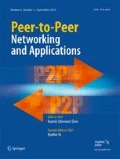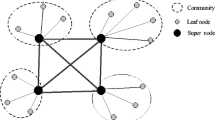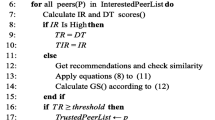Abstract
Free riding is a major problem in peer-to-peer networks. Reputation management systems are generally employed to overcome this problem. In this paper, a new reputation based scheme called probabilistic resource allocation is proposed. This strategy probabilistically decide whether to provide the resource to requesting peer or not. Aforesaid method gives selection preference to higher reputation peers and at the same time provides some finite probability of interaction between those peers who don’t have good reputation about each other. This avoids disconnection between the aforesaid peers. The proposed scheme also introduces a new mechanism for resource distribution which not only allocates resources based on peers’ reputation but simultaneously maximizes network utility also. Algorithm for formation of interest groups based upon both similarity of interests and reputation between peers is also presented.




Similar content being viewed by others
References
Gnutella website (2007). http://www.gnutella.com/
Adar E, Huberman BA (2000) Free riding on gnutella. First Monday 5:2000
Andrew O (1999) Data networks are lightly utilized, and will stay that way. Technical report
Banerjee D, Saha S, Sen S, Dasgupta P (2005) Reciprocal resource sharing in p2p environments. In: Proceedings of the fourth international joint conference on Autonomous agents and multiagent systems, AAMAS ’05, pp 853–859. ACM, New York
Boyd S, Ghosh A, Prabhakar B, Shah D (2006) Randomized gossip algorithms. IEEE/ACM Trans Netw 14(SI):2508–2530
Chen J, Huijuan L, Bruda SD (2009) A solution for whitewashing in p2p systems based on observation preorder. International Conference on Networks Security, Wireless Communications and Trusted Computing 2:547–550
Farahbakhsh R, Crespi N, Cuevas A, Adhikari S, Mani M, Sanguankotchakorn T (2012) socp2p: P2p content discovery enhancement by considering social networks characteristics. In: Computers and Communications (ISCC), 2012 IEEE Symposium on, pp 000530–000533
Feldman M, Lai K, Stoica I, Chuang J (2004) Robust incentive techniques for peer-to-peer networks. In: Proceedings of the 5th ACM conference on Electronic commerce, EC ’04, pp 102–111. ACM, New York
Gupta R, Singh YN (2013) Avoiding whitewashing in unstructured peer-to-peer resource sharing network. CoRR, arXiv:1307.5057
Gupta R, Singh YN (2013) Trust estimation in peer-to-peer network using blue. CoRR, arXiv:1304.1649
Karakaya M, Korpeoglu I, Ulusoy O (2009) Free riding in peer-to-peer networks. IEEE Internet Computing 13(2):92–98
Kung HT, Wu C-H (2003) Differentiated admission for peer-to-peer systems: Incentivizing peers to contribute their resources. In: Proceedings of the 1st Workshop on Economics of Peer-to-Peer Systems
Liu G, Shen H, Ward L (2012) An efficient and trustworthy p2p and social network integrated file sharing system. In: 2012 IEEE 12th International Conference on Peer-to-Peer Computing (P2P), pp 203–213
Ma H, Leung Hf (2006) A demand and contribution based bandwidth allocation mechanism in p2p networks: A game-theoretic analysis. In: 2006 20th International Conference on Advanced Information Networking and Applications, AINA 2006, vol 1, pp 1005–1010
Ma RTB, Lee SCM, Lui JCS, Yau DKY (2006) Incentive and service differentiation in p2p networks: a game theoretic approach. IEEE/ACM Trans Netw 14(5):978–991
Meo M, Milan F (2006) A rational model for service rate allocation in peer-to-peer networks. In: Proceedings of the 25th IEEE International Conference on Computer Communications, INFOCOM 2006, pp 1–5
Padhye J, Firoiu V, Towsley D, Kurose J (1998) Modeling tcp throughput: a simple model and its empirical validation. SIGCOMM Comput Commun Rev 28(4):303–314
Papaioannou TG, Stamoulis GD (2006) Reputation-based policies that provide the right incentives in peer-to-peer environments. Comput Netw 50(4):563–578
Peng D, Liu W, Lin C, Chen Z, Peng X (2008) Enhancing tit-for-tat strategy to cope with free-riding in unreliable p2p networks. In: Proceedings of the 2008 Third International Conference on Internet and Web Applications and Services, ICIW ’08, pp 336–341. IEEE Computer Society, Washington
Samuel MD, Balakrishnan R (2012) A grade-based incentive mechanism with starvation prevention for maintaining fairness in peer-to-peer networks. Int J Systems Assurance Engineering and Management 3(2):84–99
Satsiou A, Tassiulas L (2010) Reputation-based resource allocation in p2p systems of rational users. IEEE Trans Parallel Distrib Syst 21(4):466–479
Shenker S (2006) Fundamental design issues for the future internet. IEEE J Sel A Commun 13(7):1176–1188
Wang Q, Wang J, Jian Y, Mei Y, Zhang Y (2012) Trust-aware query routing in p2p social networks. Int J Commun Syst 25(10):1260–1280
Wang T-M, Lee W-T, Wu T-Y, Wei H-W, Lin Y-S (2012) New p2p sharing incentive mechanism based on social network and game theory. In: 2012 26th International Conference on Advanced Information Networking and Applications Workshops (WAINA), pp 915–919
Yan Y, El-atawy A, Al-shaer E (2007) Ranking-based optimal resource allocation in peer-to-peer networks. In: 26th Annual IEEE International Conference on Computer Communications (INFOCOM)
Zhou R, Hwang K, Cai M (2008) Gossiptrust for fast reputation aggregation in peer-to-peer networks. IEEE Trans Knowl Data Eng 20(9):1282–1295
Author information
Authors and Affiliations
Corresponding author
Rights and permissions
About this article
Cite this article
Gupta, R., Singha, N. & Singh, Y.N. Reputation based probabilistic resource allocation for avoiding free riding and formation of common interest groups in unstructured P2P networks. Peer-to-Peer Netw. Appl. 9, 1101–1113 (2016). https://doi.org/10.1007/s12083-015-0389-0
Received:
Accepted:
Published:
Issue Date:
DOI: https://doi.org/10.1007/s12083-015-0389-0




